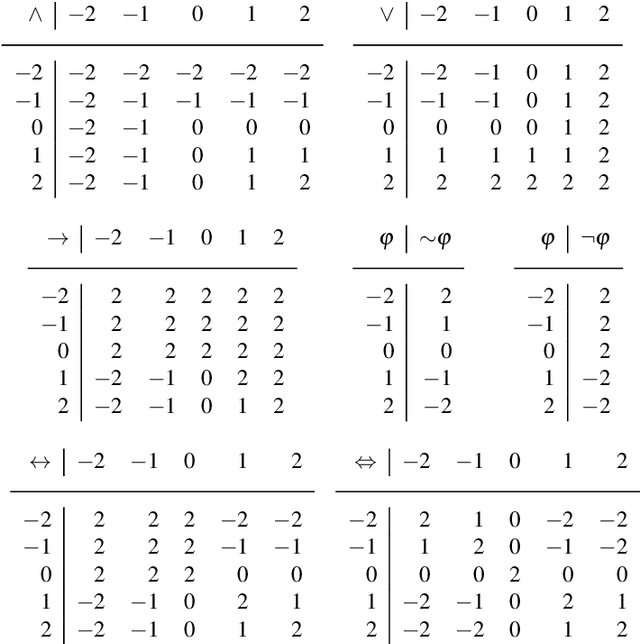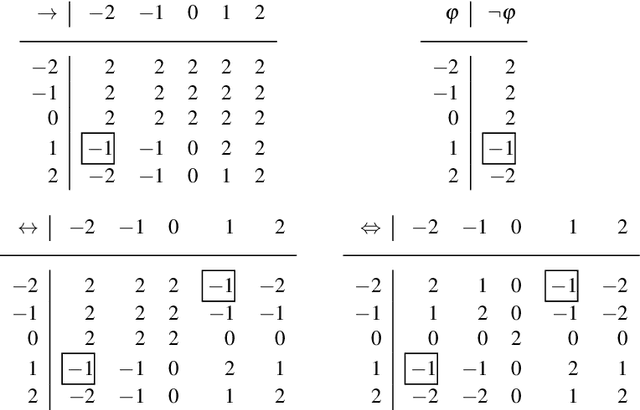David Pearce
Revisiting Explicit Negation in Answer Set Programming
Jul 26, 2019

Abstract:A common feature in Answer Set Programming is the use of a second negation, stronger than default negation and sometimes called explicit, strong or classical negation. This explicit negation is normally used in front of atoms, rather than allowing its use as a regular operator. In this paper we consider the arbitrary combination of explicit negation with nested expressions, as those defined by Lifschitz, Tang and Turner. We extend the concept of reduct for this new syntax and then prove that it can be captured by an extension of Equilibrium Logic with this second negation. We study some properties of this variant and compare to the already known combination of Equilibrium Logic with Nelson's strong negation. Under consideration for acceptance in TPLP.
Functional ASP with Intensional Sets: Application to Gelfond-Zhang Aggregates
May 02, 2018Abstract:In this paper, we propose a variant of Answer Set Programming (ASP) with evaluable functions that extends their application to sets of objects, something that allows a fully logical treatment of aggregates. Formally, we start from the syntax of First Order Logic with equality and the semantics of Quantified Equilibrium Logic with evaluable functions (QELF). Then, we proceed to incorporate a new kind of logical term, intensional set (a construct commonly used to denote the set of objects characterised by a given formula), and to extend QELF semantics for this new type of expression. In our extended approach, intensional sets can be arbitrarily used as predicate or function arguments or even nested inside other intensional sets, just as regular first-order logical terms. As a result, aggregates can be naturally formed by the application of some evaluable function (count, sum, maximum, etc) to a set of objects expressed as an intensional set. This approach has several advantages. First, while other semantics for aggregates depend on some syntactic transformation (either via a reduct or a formula translation), the QELF interpretation treats them as regular evaluable functions, providing a compositional semantics and avoiding any kind of syntactic restriction. Second, aggregates can be explicitly defined now within the logical language by the simple addition of formulas that fix their meaning in terms of multiple applications of some (commutative and associative) binary operation. For instance, we can use recursive rules to define sum in terms of integer addition. Last, but not least, we prove that the semantics we obtain for aggregates coincides with the one defined by Gelfond and Zhang for the Alog language, when we restrict to that syntactic fragment. (Under consideration for acceptance in TPLP)
Interpolable Formulas in Equilibrium Logic and Answer Set Programming
Jan 16, 2014Abstract:Interpolation is an important property of classical and many non-classical logics that has been shown to have interesting applications in computer science and AI. Here we study the Interpolation Property for the the non-monotonic system of equilibrium logic, establishing weaker or stronger forms of interpolation depending on the precise interpretation of the inference relation. These results also yield a form of interpolation for ground logic programs under the answer sets semantics. For disjunctive logic programs we also study the property of uniform interpolation that is closely related to the concept of variable forgetting. The first-order version of equilibrium logic has analogous Interpolation properties whenever the collection of equilibrium models is (first-order) definable. Since this is the case for so-called safe programs and theories, it applies to the usual situations that arise in practical answer set programming.
Interpolation in Equilibrium Logic and Answer Set Programming: the Propositional Case
Dec 17, 2010Abstract:Interpolation is an important property of classical and many non classical logics that has been shown to have interesting applications in computer science and AI. Here we study the Interpolation Property for the propositional version of the non-monotonic system of equilibrium logic, establishing weaker or stronger forms of interpolation depending on the precise interpretation of the inference relation. These results also yield a form of interpolation for ground logic programs under the answer sets semantics. For disjunctive logic programs we also study the property of uniform interpolation that is closely related to the concept of variable forgetting.
Characterising equilibrium logic and nested logic programs: Reductions and complexity
Jun 13, 2009Abstract:Equilibrium logic is an approach to nonmonotonic reasoning that extends the stable-model and answer-set semantics for logic programs. In particular, it includes the general case of nested logic programs, where arbitrary Boolean combinations are permitted in heads and bodies of rules, as special kinds of theories. In this paper, we present polynomial reductions of the main reasoning tasks associated with equilibrium logic and nested logic programs into quantified propositional logic, an extension of classical propositional logic where quantifications over atomic formulas are permitted. We provide reductions not only for decision problems, but also for the central semantical concepts of equilibrium logic and nested logic programs. In particular, our encodings map a given decision problem into some formula such that the latter is valid precisely in case the former holds. The basic tasks we deal with here are the consistency problem, brave reasoning, and skeptical reasoning. Additionally, we also provide encodings for testing equivalence of theories or programs under different notions of equivalence, viz. ordinary, strong, and uniform equivalence. For all considered reasoning tasks, we analyse their computational complexity and give strict complexity bounds.
A Polynomial Translation of Logic Programs with Nested Expressions into Disjunctive Logic Programs: Preliminary Report
Jul 19, 2002Abstract:Nested logic programs have recently been introduced in order to allow for arbitrarily nested formulas in the heads and the bodies of logic program rules under the answer sets semantics. Nested expressions can be formed using conjunction, disjunction, as well as the negation as failure operator in an unrestricted fashion. This provides a very flexible and compact framework for knowledge representation and reasoning. Previous results show that nested logic programs can be transformed into standard (unnested) disjunctive logic programs in an elementary way, applying the negation as failure operator to body literals only. This is of great practical relevance since it allows us to evaluate nested logic programs by means of off-the-shelf disjunctive logic programming systems, like DLV. However, it turns out that this straightforward transformation results in an exponential blow-up in the worst-case, despite the fact that complexity results indicate that there is a polynomial translation among both formalisms. In this paper, we take up this challenge and provide a polynomial translation of logic programs with nested expressions into disjunctive logic programs. Moreover, we show that this translation is modular and (strongly) faithful. We have implemented both the straightforward as well as our advanced transformation; the resulting compiler serves as a front-end to DLV and is publicly available on the Web.
 Add to Chrome
Add to Chrome Add to Firefox
Add to Firefox Add to Edge
Add to Edge